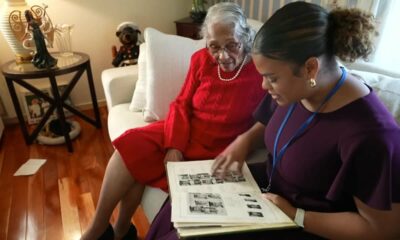Mississippi Today
Illuminating psychological thriller ‘Gaslight’ opens at New Stage Theatre

Jackson, Miss. — “Gaslight” casts an eerie glow of suspense at New Stage Theatre, where a Victorian house of flickering lamps and shifting shadows feeds a haunting sense of unease that feels like a button-glove fit for Halloween.
Its timely tuck in the midst of an election season seems fitting, too, as the psychological manipulation at the story’s heart — a husband’s willful intent to unsettle his wealthy wife’s sense of reality and drive her mad — resonates in an age of misinformation, deepfakes, foreign influence attempts and oft-repeated lies that can spread like wildfire across social media.
“Gaslight” by Steven Dietz, based on the original 1938 play by Patrick Hamilton, has its regional premiere at New Stage Theatre, with an Oct. 22 opening and performances through Nov. 3.
The acclaimed original spawned a host of incarnations, including the hit American play “Angel Street” and classic British and American films (both named “Gaslight”) in the 1940s. The acclaimed American version snagged two Oscars, for Best Actress Ingrid Bergman and Best Production Design, and was nominated for five others, including Best Picture.
“Gaslighting” first emerged as a verb in the mid-20th century, describing deception similar to that in the drama, but reached its zenith in current times as a broader shorthand for misleading someone for personal gain and in 2022 became Merriam-Webster’s Word of the Year.
The thriller’s newer, concise version moves the drama from London to 1880s-era New York, and gives the women in the story, the wife and two maids, more agency, as well other updates in a suspenseful story that unfolds over a single night in the stifling confines of a gloomy Victorian house on the East Side. Underscoring enhances a film noir-like atmosphere.
“It’s not the typical melodrama, where the white knight comes in and saves the damsel in distress,” said Drew Stark, who plays Jack Manningham, the husband whose charm may hide an undercurrent of greed and secret, sinister intent. “Villains are always fun, but the idea is not to play ‘I’m an evil villain’ with a twirling mustache of the melodrama era. But, to try to really focus on what I want, even though it’s different from what other people want and perhaps what society wants,” he said of his character’s goal to unravel his wife’s sanity and land her in a mental institution.

Hannah Elizabeth Freeman of Brandon, a recent transplant from Kansas City, Missouri makes her New Stage debut as Bella Manningham, a relative newlywed only a few years into her marriage with Jack and still very much in love. “She tries so hard to make him happy. She wants to be happy, desperately. She is orphaned at this point in her life. Her dad has passed away, and her mother was sent away. So, she’s fairly isolated and Jack is her lifeline and connection to the outside world.”
Her guiding line is Bella’s statement, “I live forever now in a world of doubt, not knowing what’s real and what I have invented.” Throughout, she is desperately trying to figure out what is real and who to trust. “It’s a psychological thriller, so it’s perfect for Halloween. … I think people will really feel like it’s the perfect time of year to go on this ride with Bella.” Even if audiences know the story on the front end, cast and crew hope they will revel in the fun as clues pop up and the mystery unfolds.
Ward Emling has the role of Sgt. Rough, a retired British detective who had worked with the New York City police early in his career and just cannot let go of an unsolved murder from his early days as a young officer on the New York police force. “I come into their tenuous world, and stir it up a bit,” he said of Sgt. Rough, who shows up at the house on this fateful evening, with a quest to prove his theory about the crime. He also soon sees the need to lift up Bella, give her strength, gain her trust and even win her over to help. He also manages to inject a bit of levity into this dark, tension-filled situation. Malaika Quarterman as the loyal senior maid, Marquita Levy as the sassy, younger maid, and Keith Allen Davis Jr. and Jacob Heuer as police officers, complete the cast.
“It’s interesting that the term ‘gaslighting’ was not a term until after Patrick Hamilton’s play — that it gave rise to the psychological term,” said New Stage Theatre Artistic Director Francine Thomas Reynolds, who also directs this production. New adaptations of the story that draw out the women characters find more relevance in contemporary times. “How do you deal with manipulation? How do you come through it? … I think people will recognize the tactics of belittling someone and invalidating someone.”
“These conditions, these situations certainly exist today — someone wanting money, and using charm to get money,” Reynolds said. Bullying and the use of drugs and emotional control to target vulnerabilities and render people, often women, more pliable also resonate in today’s headlines.

In a broader, societal context, the illusion vs. reality question finds parallels, too. “In looking at the play, I saw a lot of relation to misinformation,” Reynolds said. “We hear things and are told things and we’re told we need to believe them. What’s real news? What’s fake news?
“In an age when we have so many choices for information, what’s real and what’s not is really hard to decipher.”
Performances of “Gaslight” are at 7 p.m. Oct. 23-26, 29, 31 and Nov. 1-2, 2 p.m. Oct. 27 and Nov. 3, and 1 p.m. Oct. 30 at New Stage Theatre, 1100 Carlisle St., Jackson, Miss. Tickets are $35 each with discounts for seniors, students and military. Call 601-948-3533 ext. 223 or visit www.newstagetheatre.com for tickets or more information on the production.
This article first appeared on Mississippi Today and is republished here under a Creative Commons license.![]()
Mississippi Today
Suspended attorney blamed for dismissal of $100M lawsuit
Suspended attorney blamed for dismissal of $100M lawsuit
A Jackson attorney suspended from the practice last year for taking contraband into a jail could face further Mississippi Bar disciplinary action for how he allegedly represented plaintiffs in a multimillion-dollar, wrongful death class action federal lawsuit, leading to its dismissal.
A March 25 investigative hearing is scheduled before the Bar on Reggie Ruffin’s complaint against attorney Guy N. Rogers Jr.

Reggie Ruffin of Dallas initially filed a federal lawsuit in 2020 in Texas alleging his father, Jimmie Lee Ruffins, was exposed to asbestos while working as a machine operator and pest control worker at the Frito-Lay plant in Jackson, causing him to develop lung cancer and ultimately die on July 4, 2010, at the age of 69. However, the case was dismissed in Texas, citing statute of limitations
Ruffin then filed a class action lawsuit in Mississippi in 2021 against Frito-Lay North America and its parent company, PepsiCo, on behalf of his father and other workers at the Jackson plant.
In addition to Ruffin’s father, the lawsuit alleged three others died from cancer related to their employment at the Frito-Lay plant, and others were being treated. All the employees worked for more than 20 years at the Frito-Lay plant, which was located at 1325 Boling St. in Jackson, according to the lawsuit. The plant closed in 1999.
The lawsuit said the workers suffered injury, damages and death from serious illnesses such as lung cancer, brain cancer, mesothelioma, Parkinson’s Disease, leukemia, ovarian cancer and other neurological disorders. “The direct and proximate cause of these injuries was plaintiffs’ exposure to unreasonably dangerous, disease-causing, hazardous, and toxic substances which were in use each day at the facility and in the structure/physical plant,” according to the lawsuit.
PepsiCo said in a statement for this story: “The safety, health, and well-being of our associates is one of our top priorities as a company. We have established policies and systems to provide and maintain a safe and healthy workplace, and we are dedicated to engaging with our employees to continually improve.”
U.S. District Judge Dan Jordan dismissed the lawsuit in December 2022 on a motion by Frito Lay North America Inc. and PepsiCo, citing the lawsuit was barred by Mississippi’s three-year statute of limitations clause in wrongful death cases.
But Jordan said in court papers the reason for dismissing the lawsuit was because plaintiffs didn’t respond to Frito Lay’s motion to dismiss the lawsuit in the timeframe set, which Ruffin lays squarely on Rogers.
Jordan said Frito-Lay and PepsiCo sought dismissal with prejudice in the motion, but the plaintiffs did not respond. He then entered a show cause order giving plaintiffs a second chance to respond and warning the motion would be granted if they did not.
“The court therefore concludes that defendants’ motion to dismiss with prejudice should be granted on the merits, for failure to prosecute, and for failure to obey a court order,” he ruled.
Now almost three years later, Ruffin’s Bar complaint blames Rogers, who represented him and the other plaintiffs in the lawsuit, for dismissal. Ruffin said Rogers refused to serve Frito-Lay and file documents in the case. He cited other factors as well. But Ruffin said in a phone interview that had he known documents weren’t being filed; he would have driven from his home in Dallas to Jackson to file them in court.
Repeated efforts to reach Rogers regarding Ruffin’s allegations failed. Phone numbers and emails associated with Rogers when he was a practicing attorney are no longer in service.
Since Rogers is already on suspension, it’s uncertain what disciplinary action he could face if Ruffin’s complaint is deemed credible.
Without mentioning Rogers’ case, Mississippi Bar General Counsel Melissa Scott said a suspended attorney can face additional disciplinary action in a separate case.
Scott said each case is different, but an investigatory hearing generally involves a notice for the respondent attorney to appear at a set date and time. She said an attorney in her office will question the respondent attorney about the allegations in the informal Bar complaint.
The Office of General Counsel then reports its findings back to the Committee on Professional Responsibility, which will make the decision on whether to recommend disciplinary action to the Mississippi Supreme Court.
Retired Texas attorney Kevin Kurtz said in Ruffin’s complaint to the Mississippi Bar that Rogers was given contact information for the process server to serve summons to Frito-Lay at the company’s national headquarters in Dallas, but it didn’t occur.
“Who files a $100 million civil suit and fails to serve the defendants?” Kurtz said in Ruffin’s Bar complaint.
Kurtz said the lawsuit against Frito Lay was dismissed because Rogers disgraced himself, his profession and worst of all his clients who counted on him to seek justice.
Although Jordan dismissed the lawsuit based on the failure to respond to the motion to dismiss, he cast doubt on it being successful, saying the federal claims were meritless, and the current claims as written would not survive the statute of limitations.
Ruffin said he and other plaintiffs knew about the statute of limitations, but argued they didn’t learn until 2018 that workers may have been exposed to contamination. Also, he said some workers, who suffered long-term medical conditions were alive when the class action lawsuit and some are alive today.
In August of last year, the Mississippi Supreme Court suspended Rogers after he entered a plea to a felony charge in Warren County of possessing contraband in a jail facility. The Mississippi State Bar called for Rogers’ disbarment and opted for suspension.
Rogers entered a best-interest plea, which is technically a guilty plea. The Warren County Circuit Court withheld the plea subject to a 36-month probationary period, which could lead to the charge being dismissed if Rogers doesn’t violate the terms of the probation.
Rogers argued in court papers he shouldn’t be disbarred for accidentally taking a cellphone wire into the Warren County Jail. He said at the most, he should be subjected to some type of disciplinary action, but not the drastic sanction of disbarment.
Rogers said at the time that he only entered the Alford plea to avoid trial, even though the state could not prove their case. He said prosecutors wouldn’t offer a misdemeanor plea or anything less than a felony plea because he used profanity towards a plain-clothes deputy of the Warren County Sheriff Department.
The indictment against Rogers said he attempted to furnish or assist In furnishing two black Android cellphone cords to an inmate at the Warren County Jail.
The state high court struck Rogers’ name from the Bar roll and immediately suspended him from the practice of law, but denied the Bar’s request for disbarment, saying disbarments are reserved for final convictions. If Rogers successfully completes his 36-month probation and has the charge against him dismissed, he can petition for reinstatement to the Bar.
This article first appeared on Mississippi Today and is republished here under a Creative Commons license.![]()
Mississippi Today
House chairman pushes for absentee ballot expansion instead of early voting

Elections Committee Chairman Noah Sanford has successfully pushed some House members to scrap a Senate proposal to establish early voting in Mississippi and expand the state’s absentee voting program instead.
Sanford, a Republican from Collins, last week got the committee to adopt a plan clarifying voters who anticipate their employers might require them to work on Election Day and adding that people who care for children or disabled adults can vote by absentee.
“I’m the poster child for this,” Sanford said. “I’ve got a 5-year-old, a 2-year-old and a 9-month-old. I can promise you, you don’t want me bringing them into the polling place. They’d be knocking something over, and it would be a bad experience for all of us.”
The plan passed the Elections Committee with no audible opposition, and it can now go before the full House for consideration.
Sanford’s proposal also establishes an early voting task force, although Sanford held a hearing over the summer to study the issue. It also allows election workers to process absentee ballot forms leading to Election Day.
To vote by absentee, a voter must meet one of around a dozen legal excuses, such as temporarily living outside of their county or being over 65. Mississippi law doesn’t allow people to vote by absentee purely out of convenience or choice.
The Senate passed a proposal, authored by Republican Sen. Jeremy Englad of Vancleave, that would have established 15 days of no-excuse, in-person early voting and required voters to present a valid photo ID to an elections worker.
Sanford told committee members that the Senate proposal does not have enough support from House members needed for it to pass. If the House passes Sanford’s proposal, it would return it to the Senate for consideration.
Mississippi is one of only three states that do not have no-excuse early voting or no-excuse absentee voting.
This article first appeared on Mississippi Today and is republished here under a Creative Commons license.![]()
Mississippi Today
Mississippi Today is moving its offices to downtown Jackson
Mississippi Today is moving its offices to downtown Jackson
Mississippi Today, the state’s flagship nonprofit newsroom, is moving its offices to downtown Jackson from Ridgeland.
For us, this move is more than just a change of address — it’s a reflection of our belief in Jackson’s promise. In late February, we announced the launch of a team of reporters focused on covering the city of Jackson. We believe strongly that the success of the entire state of Mississippi relies on the success of Jackson.
READ MORE: Mississippi Today announces new team of reporters to cover the city of Jackson
Downtown Jackson, in particular, is Mississippi’s heartbeat. The values represented in this neighborhood are the values that define the people of the entire state: creativity, determination, perseverance, and a tangible sense of community. By investing in this space, we’re investing in the people, businesses, and leaders who are already shaping the city and state every day. And we hope to be representative of a proud next chapter that breathes life into this important place.
Our new home will be in the historic Lamar Life Building, one of Mississippi’s most iconic landmarks. Opened and dedicated in 1925 — exactly 100 years ago — it was the state of Mississippi’s first skyscraper and remains a symbol of Jackson’s growth and resilience.
This building boasts an important literary and media history. A young Eudora Welty, working for her father’s life insurance company, began her lifelong pursuit of storytelling and photography in the building. It was also home to Mississippi’s first network radio station, WJDX, and it also once housed Lamar Broadcasting Television, now known as WLBT. We are proud to build upon these legacies.
Our office, which is currently being renovated, will not only provide a comfortable home for the largest newsroom staff in the state that is already doing so much work downtown at the state Capitol and at City Hall. It will double as a community gathering place and venue for the live programming that Mississippi Today does so well. We want our space to regularly bring people downtown, and we will work to host events that every Mississippian will find engaging.
Stay tuned for more updates as we settle into our new home. We couldn’t be more excited to continue our work from the heart of Mississippi.
This article first appeared on Mississippi Today and is republished here under a Creative Commons license.![]()
-

 News from the South - Virginia News Feed5 days ago
News from the South - Virginia News Feed5 days agoVirginia woman getting ready to celebrate 100th birthday: 'I have really enjoyed life'
-

 News from the South - Missouri News Feed6 days ago
News from the South - Missouri News Feed6 days agoSt. Peters HOA spends thousands suing homeowners for their fences
-

 Mississippi Today5 days ago
Mississippi Today5 days agoSenate passes redistricting that puts DeSoto Republican, Tunica Democrat in same district, calls for 10 new elections
-

 News from the South - North Carolina News Feed6 days ago
News from the South - North Carolina News Feed6 days agoDays after woman, 2 children stabbed to death, Fayetteville community still in shock
-

 News from the South - Tennessee News Feed7 days ago
News from the South - Tennessee News Feed7 days agoHemp industry fears slate of restrictive bills could gut industry
-

 News from the South - North Carolina News Feed7 days ago
News from the South - North Carolina News Feed7 days agoWhat was the economic impact of the Billy Strings concerts? When will submerged vehicles be pulled from the rivers? • Asheville Watchdog
-

 News from the South - Texas News Feed6 days ago
News from the South - Texas News Feed6 days agoShocking audio reveals moments before Southwest plane nearly collides with jet
-

 News from the South - Florida News Feed2 days ago
News from the South - Florida News Feed2 days ago4 killed, 1 hurt in crash after car attempts to overtake another in Orange County, troopers say













































